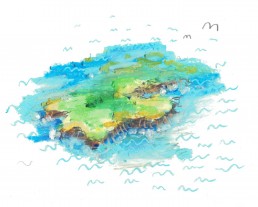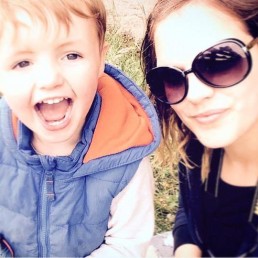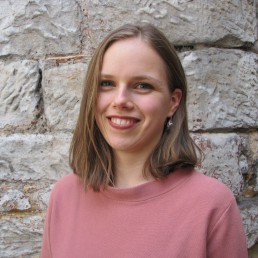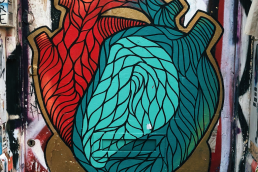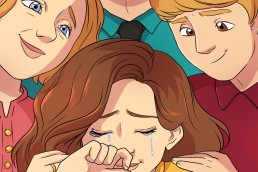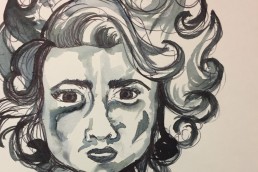Sophie Isaacson
Illustrations by Ida Henrich
When I was a young, naive 18-year-old I jumped on an aeroplane from my home on a tiny, remote island off the West coast of Scotland and flew into a brand new life in the city centre — clutching one tiny suitcase and my guitar. There were more people living in the block of flats which I moved into than the entire population of the island where I had spent the previous 18 years, and when the fire alarm went off I was overwhelmed and filled with anxiety as I stood in the middle of a huge crowd of people, realising I didn’t know any of them.
I was totally petrified. But excited too.
I quickly found myself getting eaten up by city life. Gone were the long, sandy beaches, empty fields, wild Atlantic seas and the warm, friendly, community that I had grown to love and trust. I was suddenly surrounded by traffic, thousands of people who didn’t know my name and certainly didn’t care who I was or where I’d come from. People who had never even heard of my beloved homeland, who didn’t make eye contact, didn’t know any of the beautiful Gaelic songs of the island of my childhood and who had never seen an oyster catcher floating on the breeze. People who were racing for trains, competing for promotions and in a rush. Always.
Urban life came with advantages of course. A world of fashion, art, live music and bars was before me. Suddenly it didn’t matter if I went out of the house in a dirty jumper and the anonymity which came along with city life was completely liberating. I could learn new languages, meet new people and go shopping at 1am if I wanted to… However, the comfort of a community of people looking out for you — people who know you and have always known you — was long gone and I missed the friendly faces, waving hands, and open doors.
Everyone’s journey is different but here are notes to myself which I try to remember, because even when you are a bit older (nearly 30 now!) new situations and groups can be just as daunting as they always were and can take you right back to that moment when you walk into your first shift at a new job or sit down in your first college lecture.
Take a deep breath
Like really do it, sit down and take a deep breath. Or six…or as many as you need to until you feel better. It can actually work. You will feel calmer and you’ll be able to get your head together. Psychology Today tells us that ‘there is robust scientific evidence for the benefits of mindful breathing’.
Don’t put too much pressure on yourself
Take each day as it comes. Grounding yourself in a new place takes time. I think that’s important. Let yourself adjust to your new settings, and take some time to get to know your new life. Making friends isn’t always as easy as you think. I met lots of people in the first few weeks of being in my new block of flats, but not everyone you meet is going to be good for you. Don’t be afraid to talk to people you don’t know, but be careful who you give your trust to and don’t let people lead you astray. Your gut will tell you if something doesn’t feel right so trust it.
Follow your interests
It’s easy to get swept away in the crowds of Freshers’ Week or new high school parties, but the friends who I have really stayed in touch with were people who I share similar interests and values with. Try to join clubs or groups where your passions lie and you’ll be more than likely to find a bunch of people who you get along with, not to mention you’ll actually have some fun! I learnt so much during my time in the city after I realised that I didn’t have to go to hot, sweaty nightclubs to make friends…
Remember you need time to yourself
It’s all too easy to fill up your schedule with studying, socialising and work. Although it’s great to get out there and embrace the world we all have to chill out sometimes. It’s a balancing act and it never gets easier. Try to give yourself some time each day to do the things which ground you. It might feel like you don’t have time to stop but sometimes allowing yourself an hour to read a book, go for a walk or have a nap can energise you and leave you ready to take on your next study session. Reducing stress and allowing yourself some ‘me time’ is vital. I try my hardest to fit in 20 minutes of yoga in the mornings and I always have a quiet coffee during my lunch break at work outside, to catch my breath and listen to the birds singing. Connecting with the birds, trees and flowers is so important to me; they have been here far longer than we have and can teach us so much if we just stop and watch them.
This world is fast-moving and loaded with external pressures, and we have to be prepared for it.
You are in control and you know yourself far better than anyone else does. I was lucky enough to be brought up in a caring, island community and so I have always been very trusting — and still I am — but it’s important to remember that some people have their own agenda and to give yourself slowly to the world. Don’t doubt yourself and listen to your body, you need it to be strong and believing in yourself will help you along any new path or adventure. There is so much to learn out there and so many beautiful people waiting to join you on your journey. So, let’s take on the world in a different way. Let’s fill up on friendships based on trust and passion; have plenty of chilled out moments to drink hot chocolate; make time to catch up on your favourite Netflix series. And most of all, let’s never forget to just breathe…
Sophie Isaacson
Sophie is an energetic Scottish mummy with a passion for adventure and an insatiable craving for new knowledge! Sophie is obsessed with the sea and the mountains. She loves sitting next to the fire writing poems and going for picnics with her little boy on sunny days.
Ida Henrich
Ida Henrich is a German Cartoonist, Illustrator and Designer based in Scotland. She has worked with award winning publishers, online coaches and magazines. Ida is a graduate of Communication Design at the Glasgow School of Art where she specialised in Illustration. In her own work she explores themes such as sex-education, growing up, and women’s experiences. Her comics and illustrations are written for both men and women and aim to start an open dialogue between partners, friends, parents, and children about their experiences. Ida believes that Art is a powerful way to make ideas and feelings tangible.
As Art Editor at Fearless Femme, Ida is responsible for all things visual, including the correspondence with our visual artists, the design and realisation of the online magazine and the illustration of our amazing cover women. She also creates artwork for some of our articles, poems and stories.
Ida loves her coffee in the morning, that feeling after finishing an illustration and going for a run in the (Scottish) sun; and pilates on the rainy days. Ida enjoys SciFi books and autobiographies, and autobiographical comics. She is always delighted to meet new people on trains but is also smitten being home alone colouring in an illustration that she has made way too intricate while listening to Woman’s Hour. You can contact her at ida@fearlessly.co.uk.


